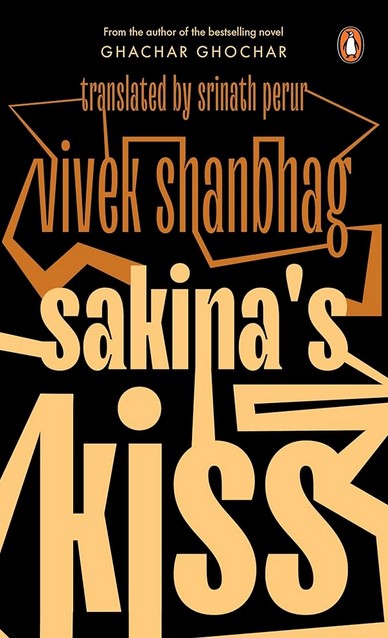REVIEWED BY KATHAKALI JANA
The ordinariness of middle-class existence is the backdrop of Vivek Shanbagh’s remarkably nuanced novel, Sakina’s Kiss, translated into English from the original Kannada by Srinath Perur. The novel explores the socio-political and cultural changes in the India of today and inter-generational conflicts within the family through the lens of the protagonist, Venkat, who is staid, predictable, judgmental and oh-so-boring. He is baffled by the circumstances that befall him and is completely out of his depth in dealing with them. It is through his perceptions – or the lack thereof – as narrator that one sees the events and grasps the ironies inherent to his existence.
Venkat’s observations and understandings of life and society are, well, unsurprisingly, limited. He is not the sort of person to whom a lot of remarkable things usually happen. But from the point we catch him in the novel, a series of bizarre incidents transpire. His daughter Rekha is away in their native village which is outside the reach of mobile network. We are told that it is customary for her to visit the village occasionally. But this time something singular happens: she vanishes from there. In pursuit of her, Venkat and his wife Viji encounter a bunch of criminals, policemen and journalists. Venkat is also forced to face ghosts from his past – ones that he had interred for a long time.
Unable to make sense of anything, Venkat, as an unsure narrator, allows the story to blow out into a full-scale thriller. The plot thickens and his secrets tumble out as he and Viji search for Rekha. Venkat says that he had never shared these stories with his wife as “revealing too much would only be giving her a stick to beat me with.” As a patriarchal man, he is not willing to let Viji have any weapon to use against him and his mediocrity and spinelessness, of which he is painfully aware. Clearly, he is not proud of either his family’s actions or his own role in what has happened in the past.
But secrets and shame have long shadows. Throughout the novel there are hints and glimpses of guilt that he has tried to hide from but has never been able to bury completely. They come out in the end, like a throbbing wound that is still festering in the recesses of Venkat’s mind. The carefully – if tediously – built stability of his life is completely shattered. He is completely unmoored, no longer sure who he is and where his life and that of his family will go next.
Caste, class and gender, as well as the intersections of the three, are some of Shanbag’s concerns in this work. He also throws in an intimate study of loneliness. When Viji and Rekha, united in their assessment of Venkat’s limited insights, prejudices and patriarchal highhandedness, gang up against him, he feels a wretched sense of alienation. Unable to sense the changes in society, he is not willing to let go of the whip. Although spread merely over four days of utter turmoil and an intense bout of running around in Venkat’s household, the revelations and the denouement cleverly bring important political and social phenomena into the scope of the novel. Like his earlier work Ghachar Ghochar, also translated by Perur, this too covers a lot of ground through playful yet sharp brush strokes. At a humble 170 pages, Sakina’s Kiss is a short and powerful exploration of the battle between idealism and cynicism. Not one to catch on to changes or challenges, Venkat fails to see his daughter’s commitment to a political ideology. With his sweeping patriarchal thought process, he trivialises her interests and convictions.
Shanbag’s eye for richly imagined details and precise observations add a lot of colour to his work. But these details also conjure up an image of India that is full of cracks in its social and family structure as well as in its politics of polarization and its lop-sided dynamics of power. It reveals a deeply unsettled and confusing space, which is a truthful representation of post-liberalisation India. Even as Venkat, an ordinary executive with a middle-sized corporate, tries with some desperation to fit neatly into his surroundings, his new emerging social order throws him completely off-balance.
This is a novel that could easily have been loud. But Shanbag’s delicacy of touch and the subtlety of his wry humour make this work refreshingly light despite its weighty dynamics. He is able to expose the uncertainties that lay underneath the truth even as he draws humour out of it. Venkat gingerly reports details of his life – his school, college, work and married life, his tics, fancies, beliefs and emotions – and the reader is urged to read between the lines and recognise the necessary frission between the personal and the political. Shanbag explores the themes of exploitation, casteism, economic and social justice, toxic patriarchy, isolation and loss in masterly strokes as he unravels the story of Venkat’s past life and explores his relationship with his daughter. The novel travels in time through multiple generations of Venkat’s family as it traces a history of corruption, manipulation and social activism. Important questions are raised about the identity of the central character who emerges as a lot more than the “common” man we knew in the beginning of the novel.
In a brilliant use of the device of naming a work, Shanbag uses a joke that acts as a commentary on one of his central themes. It plays with metaphors and underscores gaps in communication and the limits of understanding. Relationships and their dynamics are as mystifying as indecipherable handwriting, the novel appears to suggest.
Venkat’s maternal uncle Ramanna is an inscrutable figure. He writes letters that Venkat’s mother, to whom they are addressed, cannot decipher. It emerges that the family home that Venkat’s father and brother lord over is built upon a land that belonged to Ramanna. Not only have the two brothers cheated Ramanna, a left-liberal idealist, they have been responsible for a far more heinous breach of trust than that.
The translation of this bravura tour de force flows smoothly, imbued as it is with the buoyancy of Shanbag’s touch. One is left with the feeling that its mounting as a thriller owes much to the text that does not reveal too much. In fact, what is deliberately left unsaid in the novel creates a masterful build-up through a web of hints and implications. In all of this, Perur is a magnificent ally. Together they weave magic.
Also, Read Krishna Gopal Mallick’s Entering The Maze: A Rare Indulgent Voice In The Genre Of Queer Fiction, Reviewed By Suchetona Paul and published in The Antonym:
Krishna Gopal Mallick’s Entering the Maze— A Rare Indulgent Voice in the Genre of Queer Fiction
Follow The Antonym’s Facebook page and Instagram account for more content and exciting updates.



























0 Comments